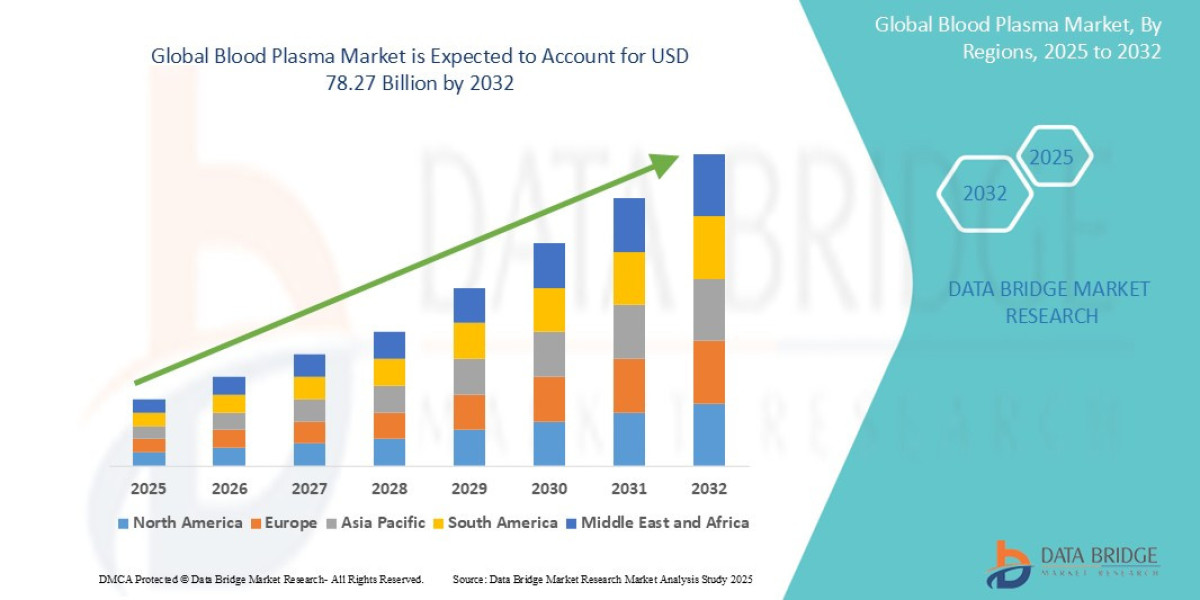Blood Plasma Market Overview
The Blood Plasma Market plays a critical role in modern healthcare, supporting the treatment of life-threatening diseases and the production of essential biopharmaceuticals. Blood plasma, the liquid component of blood, is rich in proteins such as albumin, immunoglobulins, and clotting factors. These plasma-derived components are vital in managing immune deficiencies, bleeding disorders, burns, liver diseases, and other chronic conditions.
The global Blood Plasma Market was valued at USD 34.96 billion in 2024 and is expected to reach USD 78.27 billion by 2032, growing at a CAGR of 10.60% during the forecast period. The market’s expansion is driven by the rising prevalence of rare and chronic diseases, increasing demand for plasma-derived therapies, and advancements in plasma fractionation technologies.
Competitive Landscape for Blood Plasma Market
The Blood Plasma Market is moderately consolidated, with a few key players dominating production and distribution. Companies are Allergan (Ireland), AbbVie Inc. (U.S.), GALDERMA (Switzerland), Evolus, Inc. (U.S.), Revance (U.S.), HUGEL, Inc. (South Korea), Ipsen Pharma (France), USWM, LLC. (U.S.), Sun Pharmaceutical Industries Ltd. (India), Pfizer Inc. (U.S.), GlaxoSmithKline plc (U.K.), Merz Pharma (Germany), Medytox (South Korea), Smith+Nephew (U.S.), Sanofi (France), Novartis AG (Switzerland), Teva Pharmaceutical Industries Ltd. (Israel), LGM Pharma. (U.S.), Lannett (U.S.), NorthStar Rx LLC (U.S.)
Request Sample For Blood Plasma Market @ https://www.databridgemarketresearch.com/request-a-sample?dbmr=global-blood-plasma-market
Blood Plasma Market Drivers
Rising Demand for Plasma-Derived Therapies
Plasma-derived therapies are increasingly used to treat complex and chronic conditions such as hemophilia, primary immunodeficiency diseases (PIDD), and alpha-1 antitrypsin deficiency. As the global patient population continues to rise, so does the need for efficient plasma collection and processing infrastructure.
Growing Prevalence of Chronic and Rare Diseases
The growing incidence of chronic illnesses like liver disorders, autoimmune diseases, and genetic conditions is significantly driving plasma demand. For instance, immunoglobulins derived from plasma are used to treat immune deficiencies and inflammatory disorders, making plasma therapies indispensable in modern medicine.
Technological Advancements in Plasma Fractionation
Innovations in plasma fractionation processes have improved the yield and purity of plasma-derived products. Automation and digital tracking systems in plasma collection centers enhance safety, efficiency, and traceability — essential for ensuring product quality and patient safety.
Increased Blood Donation and Collection Programs
Governments and healthcare organizations across the globe are encouraging voluntary plasma donations through awareness campaigns and partnerships with private sector players. The rising number of donation centers and improved logistics for plasma transportation are expanding the market’s global footprint.
Blood Plasma Market Segmentation
By Product Type
Immunoglobulin
Albumin
Coagulation Factor Concentrates
Protease Inhibitors
Others
By Application
Hemophilia
Immunodeficiency Disorders
Liver Disease
Shock and Burns
Neurology
Others
By End User
Hospitals and Clinics
Research Laboratories
Plasma Collection Centers
Biopharmaceutical Companies
Regional Insights
North America dominates the global plasma-derived therapies market, driven by advanced healthcare infrastructure, high plasma donation rates, and the presence of major plasma fractionation companies. The United States accounts for a significant share of global plasma collection, supported by strong regulatory frameworks and growing demand for immunoglobulins.
Europe remains a key region for plasma-derived product manufacturing, with countries such as Germany, France, and the UK leading in plasma research and therapy applications. Strict quality control and government-backed donation systems ensure product reliability and safety in this region.
Asia-Pacific is the fastest-growing market, fueled by rising healthcare awareness, expanding biopharmaceutical manufacturing capabilities, and growing investments in plasma collection infrastructure. Countries like China, India, and South Korea are becoming vital hubs for plasma-derived medicine production.
Latin America and Middle East & Africa are witnessing steady growth due to increasing adoption of advanced medical treatments and government initiatives to strengthen national blood services.
Key Market Trends
Rising Use of Immunoglobulin Therapies – The growing use of intravenous immunoglobulin (IVIG) for treating autoimmune and neurological disorders is significantly driving market demand.
Expansion of Plasma Collection Networks – Leading companies are increasing plasma collection centers globally to ensure consistent supply and reduce dependency on specific regions.
Adoption of Recombinant Technologies – Biotech firms are developing recombinant alternatives to plasma proteins, offering consistency and lower infection risks.
Growing Investment in R&D – Pharmaceutical companies are investing in next-generation plasma processing technologies and expanding clinical trials for new indications.
Sustainability and Ethical Practices – Companies are adopting eco-friendly manufacturing and ethical sourcing strategies to ensure long-term plasma supply sustainability.
Emerging Opportunities for Blood Plasma Market
Expansion of Plasma Fractionation Facilities
Developing countries are increasingly investing in local plasma fractionation facilities to reduce import dependency and meet domestic therapeutic demands. This expansion presents lucrative opportunities for global manufacturers and technology providers.
Rising Demand for Hyperimmune Globulins
The increasing use of hyperimmune globulins in treating infectious diseases and post-exposure prophylaxis is expected to create significant growth potential. These specialized plasma-derived products have gained importance in global health security initiatives.
Personalized and Targeted Plasma Therapies
The integration of genomics and precision medicine in plasma therapy development is opening pathways for highly personalized treatment options. Tailored plasma-derived products for specific genetic disorders represent a major innovation trend.
Blood Plasma Market Future Outlook
The blood plasma market outlook is poised for steady expansion, driven by the increasing need for advanced therapeutic solutions, technological innovation, and global health initiatives supporting plasma donation. As the world faces growing challenges from chronic and immune-related diseases, plasma-derived medicines will remain a cornerstone of modern healthcare.
Future trends point toward automated plasma collection systems, recombinant integration, and global standardization of donation practices. Companies that invest in sustainable plasma sourcing, efficient logistics, and innovative treatment development will be well-positioned to lead the market through 2032 and beyond.
About Us:
Data Bridge is one of the leading market research and consulting agencies that dominates the market research industry globally. Our company’s aim is to give clients the knowledge they require in order to function in changing circumstances. In order to give you current, accurate market data, consumer insights, and opinions so that you can make decisions with confidence, we employ a variety of techniques, including surveys, video talks, and focus groups around the world.
Contact :
Data Bridge Market Research Private Ltd .
3665 Kingsway — Suite 300 Vancouver BC V5R 5W2 Canada
+1 614 591 3140 (US)
+44 845 154 9652 (UK)







